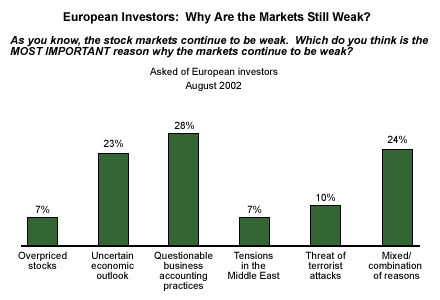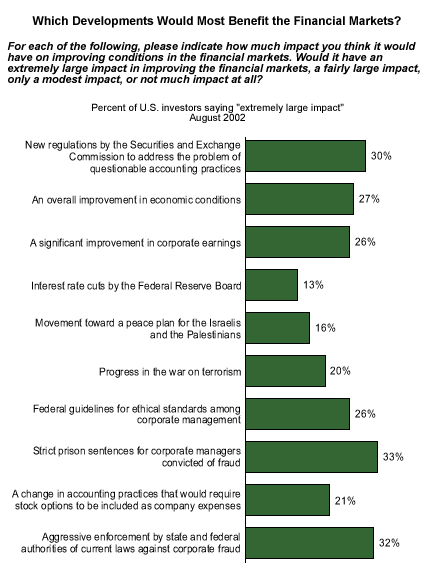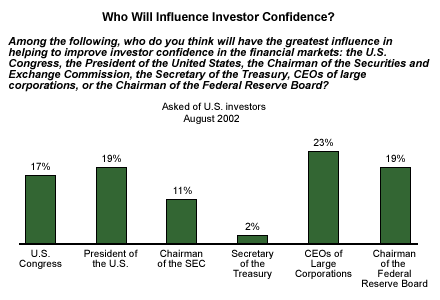In August, investor optimism hit a new low in Europe and didn't do much better in the United States, according to the Gallup/UBS Index of Investor Optimism*. The EU5 Index is now at -1 -- the first time it has entered negative (net pessimistic) territory since its baseline was established in October 2001. The U.S. Index** is now at 52 -- up slightly from last month's six-year low of 46.
What can be done to restore investor confidence and optimism? Before that question can be answered, we need to examine the reasons why investors think the current investment climate is so gloomy, and what would improve their outlook.
Accounting Issues Trouble European Investors
In response to the August Index of Investor Optimism -- EU5 survey, 28% of European investors told Gallup that they think questionable business accounting practices are the most important reason the stock markets in Europe continue to be weak. Another one-fourth of investors said that they think it is the uncertain economic outlook (23%) or a combination of factors (24%) that is weighing on the equity markets. Smaller percentages of European investors pointed to the threat of terrorist attacks (10%), tensions in the Middle East (7%), or overpriced stocks (7%).

U.S. Investors Want More Enforcement
U.S. investors believe that strict prison sentences for corporate managers convicted of fraud (33%) and more aggressive enforcement by state and federal authorities of existing laws against corporate fraud (32%) would have an extremely large positive impact on the U.S. investment climate. A significant percentage of investors also pointed to related measures such as new SEC regulations that address the problem of questionable accounting standards (30%), federal guidelines for corporate ethical standards (26%), and a change in accounting practices that would require stock options to be included as company expenses (21%).
More than one out of four investors said that an overall improvement in economic conditions (27%) and a significant improvement in corporate earnings (26%) would also have an extremely large positive impact on the current investment climate. Significantly, only 13% of investors pointed to a cut in interest rates, suggesting that the Fed's power to bolster investor confidence may be much more limited than in the past.

Who Can Have the Most Impact?
Who do investors think can have the greatest influence in helping to improve the investment climate? U.S. investors point to large-company CEOs, as well as the president, the chairman of the Fed, and Congress as most able to positively impact investor confidence.

Key Points
Congress recently passed new legislation to more aggressively deal with corporate and accounting malfeasance. This effort and the SEC's CEO signoff day seem to have helped the markets during the past few weeks. It will take time, however, for investors to perceive that government efforts are providing stronger and swifter enforcement of the current laws against corporate fraud and abuse. In the interim, I believe policy-makers should take additional actions to improve the current investment climate.
When Congress returns from its Labor Day break, it will have to decide whether it is going to trust those who say the economy is fine and should be left alone, or act to stimulate economic growth. The president and the Fed will face a similar decision. Another short-term surge in auto sales resulting from the latest batch of sales incentives could make the decision even more difficult. This inventory liquidation effort may artificially make a laissez-faire "trust and hope" approach seem more attractive.
The reality is, however, that corporate corruption has dealt worldwide investor confidence a severe blow, and low investor confidence has in turn created significant problems for a U.S. economy already struggling to recover. If the president and Congress do in fact adopt the "trust and hope" stance and the economy remains weak, they should not be surprised if things go badly for them at the polls this November.
*Results for the Index of Investor Optimism -- EU5 are based on interviews with approximately 200 investors each in France, Germany, Great Britain, Italy, and Spain conducted July 22 to August 16, 2002. For results based on a total sample of approximately 1,000 investors, one can say with 95% confidence that the margin of sampling error ±3 percentage points. In addition to sampling error, question wording and practical difficulties in conducting surveys can introduce error or bias into the findings of public opinion polls.
** Results for the Index of Investor Optimism -- U.S. are based on telephone interviews with 1,012 investors, aged 18 and older, conducted Aug. 1-15, 2002. For results based on the total sample of investors, one can say with 95% confidence that the margin of sampling error is ±3%.
